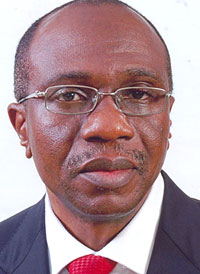The Assembly of Governors of the Association of African Central Bank Governors (AACB) on Friday elected the Governor, Central Bank of Nigeria (CBN), Mr. Godwin Emefiele as the President of the ACCB for the 2016 – 2017 year.
The 39th Ordinary meeting of the Assembly ended in Abuja today.
Elected, alongside Mr. Emefiele, to run the affairs of the Bureau for the period are the Governor of the Bank of Ghana as chairman of the West African sub-region; Governor of the Central Bank of Mauritania, Chairman of the North African sub-region; and the Governor of the Bank of Central African States, Chairman of the Central African Sub-region.
Also elected were the Governor, Banque de la Republique du Burundi as Chairman of the East African Sub-region and Governor of the Central Bank of the Kingdom of Swaziland as Chairman of the Southern African Sub-region.
Reading the communique at the end of the meeting of Governors, the new AACB President, Mr. Emefiele disclosed that the nomination for the Vice Chairman of the AACB, which is zoned to the South African Sub-region, would be made known in due course.
The Assembly of Governors also chose: “Prospects for monetary integration in Africa: Lessons learned from the experience of monetary and financial integration of Europe,” as theme for the 2017 symposium.
According to the communique, the meeting noted that the unwinding of unconventional monetary policy measures, adopted during the financial crisis by the United States Federal Reserve and central banks of developed countries, could have a negative impact on African countries due to the interconnectedness of economies.
However, the congress noted that the unwinding of unconventional monetary policy could be an opportunity for African countries to develop appropriate measures to strengthen their resilience in the face of exogenous shocks.
The Assembly of Governors therefore stressed the necessity for African countries to diversify their economies and improve exports, while limiting imports.
The Assembly also emphasised the urgent need for coordination between monetary and fiscal policy across all African countries.
The Governors equally examined the implementation status of the African Monetary Cooperation Programme (AMCP) and pointed out the inability of African States to sustainably meet some of the criteria for macroeconomic convergence due to the negative impact of certain variables within the international environment.
They therefore urged African countries to strengthen efforts at implementing structural reforms in order to diversify their respective economies, improve the business environment and promote intra-regional trade as a way of strengthening their resilience amidst external shocks.
In reviewing the implementation of the work programme of the Community of African Banking Supervisors (CABS), which it noted had helped to set up an intranet platform for exchange of information among African banks, the AACB disclosed plans to unveil a project for collecting information on the activities of cross-border banks. This, the AACB noted, would allow the identification of risks associated with the activities.
The 39th Ordinary meeting of the Association of African Central Banks (AACB) was attended by 27 member Central Banks and the African Union Commission (AUC).
(adsbygoogle = window.adsbygoogle || []).push({});


